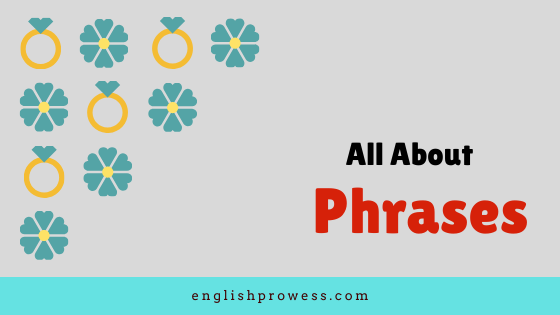Table of Contents
Definition of Phrases
A phrase is a group of words, generally, a part of the sentence, not a complete sentence. A phrase in itself carries a particular meaning but not a complete meaning. It always complements the meaning of a sentence. As you become familiar with the English language, you become familiar with these phrases too.
A few examples are apple of one’s eyes, actions speak louder than words, once in a blue moon, regarding a horse, at a time, under the table, above the box, eating food, etc.
Types of Phrases
According to how a phrase is put in the sentence it can be of different types such as noun phrases, adverb phrases, preposition phrases, etc.
Various types of phrases are as follows:
- Absolute Phrases
- Adjective Phrases
- Adverb Phrases
- Appositive Phrases
- Gerund Phrases
- Infinitive Phrases
- Noun Phrases
- Participle Phrases
- Prepositional Phrases
- Verb Phrases
Let’s discuss these various types of phrases one by one with suitable examples.
Absolute Phrases
Absolute phrases are those phrases that modify a complete sentence. Here modify means to add on the meaning of a sentence. These phrases contain a noun or pronoun. Besides they can also have participle, a sentence modifier, and an object. One important thing to be noticed here is that absolute phrases do not contain any finite verb as it will give them a complete sentence structure. As we have mentioned already these are just modifiers, not a complete sentence hence this is not possible to have a finite verb.
Examples-
- They, waiting for their partner, ate all the food.
- It, being a sunny day, we get relief from the cold.
- She, having vegetables in her hands, was going home.
One more point to take into consideration is that these phrases are not connected by any conjunction. Generally, these are separated by using a comma.
Remarks- Absolute phrases are also called nominative phrases. A noun phrase or prepositional phrase also can be an absolute phrase. These phrases are commonly used in fiction writing as these add a focusing detail into the sentence.
Adjective Phrases
A phrase that behaves like an adjective in the sentence is called an adjective phrase. An adjective phrase is a phrase that modifies the meaning of a noun or pronoun. The adjective present in the adjective phrase can appear anywhere in the sentence, either in the beginning, middle or at the end of the sentence. The position of adjective phrase can be after or before the noun/pronoun in a sentence.
Infinitive phrases, participle phrases, and Prepositional phrases all these can act as adjective phrases in the sentence.
Examples
- A bird on the tree is chirping.
- The girl in the shop is my sister.
- The clothes in the almirah are mine.
- She purchased a beautiful white horse.
- Please clean the dust under the sofa.
- I gave her a glass full of water.
- A cat with long fur is roaming in the house.
- Eating junk food is usually not very healthy.
An adjective phrase can be very helpful in beautifying the literature writings.
Adverb Phrases
A phrase that executes the behavior of an adverb in the sentence is called the adverb phrase. Similar to an adverb, adverb phrases modify a verb, an adjective or any other adverb. Infinitive phrases and prepositional phrases can also act as adverb phrases.
For example
- I put the keys there.
- I put the keys right there.
- I put the keys right there on the table.
In these sentences, there, right there, right there on the table all are adverb phrases. Let us see a few more sentences based on adverb phrases.
- She drives a car at a very low speed.
- She entertained the audience in a nice way.
- He was running very fast.
- The guests stayed at our home for a very few hours.
- The couple walked along the bank of the river.
- He always speaks in a polite way.
- Dan spoke softly to calm his fear.
- He responded very nicely.
- He walks for one hour every day.
- You need to drive your bike very carefully.
- She did the tasks with much care.
- They must leave before sunset to avoid any hassle.
- In the river, many creatures are there.
Appositive Phrases
An appositive phrase is a phrase that gives more information about the noun or a noun phrase in a sentence. It consists of an apposite present in the sentence and one modifier. One notable thing is that any type of phrase contains a modifier also in the sentence because of a phrase act as a modifier. These phrases are usually shown by using commas, brackets, and dashes. An appositive phrase can be of two types
- Essential
- Nonessential
When an appositive phrase provides necessary and important about the noun or pronoun then this is the essential phrase. If this phrase is absent then the sentence gives an incomplete sense. Such types of phrases are essential phrases. On the other hand, nonessential phrases add on the meaning or information of the sentence which is already defined clearly. Some examples are here:
- Rosy, a teacher in a school, holds a very good command of English.
- The horse, named Chetak, is known by all.
- Statue of Unity, the tallest statue in the world, is situated at the Narmada river.
- In the book fair, I saw Krishna, my old school friend.
- His favorite ice cream, butterscotch, is found easily everywhere.
- Tomm, the Dog, is loved by all.
Gerund Phrase
From its name, it is very obvious to get the definition of this. A gerund phrase contains a gerund that acts as a noun. Besides gerund, this phrase consists of a modifier and an associated object also. While a gerund acts as a noun, gerund phrases also act in the same way that is as a noun. Let’s see some examples.
- Running with her sister refreshes her every morning.
- His singing is at its best.
- Cooking vegetables without washing them is a bad practice.
- Reading from a historic collection cheers his mood.
- Painting a canvas is my favorite to do.
- My hobby is dancing.
- Swimming is good exercise.
- Sleeping before midnight is a good habit.
- Eating much at a time causes obesity.
Infinitive Phrases
Infinitive phrases contain infinitives. Now, infinitives are those which are in the “to + verb” form. To eat, to drive, to dance, to cry, to write, to play, and many more examples are there.
An infinitive phrase consists of an infinitive (to + verb), an object and a modifier. Infinitive phrases can execute the behavior of a noun, an adjective or an adverb like an infinitive. Some of the examples are taken here:
- Let me teach you the best way to do this work.
- To dance on a stage is her dream.
- Sam likes to relax after a hectic day.
- A good manner to have is to talk politely with everyone.
- He wants to maintain a balanced work lifestyle.
- He doesn’t want to prepare for his exams.
- I went to tuition to increase my score in exams.
- Brayn helped me to remove the dust.
Noun Phrases
A group of words that behave like a noun is a noun phrase. As a noun, these phrases describe a person, place, thing or idea. In a similar manner to nouns, noun phrases also act as subjects, objects or prepositional objects. We can say that noun phrases exhibit the properties of nouns. This phrase contains nouns and modifiers. Noun phrases can function as absolute, adjectives, infinitives, participles and prepositional phrases. A set of examples is given below:
- I want a cute kitten as my birthday gift.
- The end of the day is quite good today.
- The river is deeper in the middle.
- John lives in a wooden household.
- The little cat chased the laser light.
- All citizens should have access to clean water.
- Our decision to adopt a puppy was welcomed by our friends.
- She had to sit beside the silly angry boy.
- Rom cooked a meal for five people, even though there were only two of us.
- The fluffy cat is sitting on the bed.
Participle Phrases
A participle phrase seems like a verb but it functions as an adjective in a sentence. It modifies the noun present in the sentence. This phrase can take either present or past form of participle. While using the past participle, baked, cooked such types of verbs will be used on the other hand in case of present participle a verb ending with -ing is used. Participle phrases are generally used in newspaper articles and fiction works where people want to get more information in a few words. Let us take some examples:
- I saw him running for the train.
- Fond of painting, Katy has a beautiful collection.
- Cooking my own dinner for a year, I managed to have a healthy me.
- Jerry, smiling and waving, said goodbye.
- The bike moved very slowly on the road, clogged by the jam.
- Students planning to host a function must meet with the head of the department.
- Quickly opening the door, Mary found her father there.
- Maria observed her mother, cooking in the kitchen.
- Removing his shoes, Bob entered the water.
- Watched by millions, football is a popular game.
Prepositional Phrases
A group of words that consist of a preposition, object, and modifiers. Generally, these phrases modify a noun or pronoun. This phrase starts with a preposition and normally ends with a noun or pronoun. Let’s have a look at these phrases:
- According to the situation
- After a long time
- In the end
- Under the tree
- Above the table
- Into the river
- On a plane
- During the game
- In the evening
- On Monday
- At 12 O’clock
A prepositional phrase can act as an adjective or adverb. Consider the following examples:
- Please buy a shirt with dots.
- The bike beside the black one is the one I want to purchase.
- A new bridge is under construction.
- All arrived at the same time.
- He is under treatment for the flu.
- She was walking along the beach.
- They were playing on the ground.
- He is given imprisonment for life.
- Roby threw the stone in the river.
- He decided to leave home early for the station.
- A box of chocolate was found in his bag.
- The tree is in the middle of the ground.
- The blanket is in the box.
- Most of the syllabus has been completed.
Verb Phrases
A verb phrase contains a verb and its modifiers. In verb phrases, the main verb and auxiliary verbs are present. Helping verbs are am, is, are, was, were, being, been, has, have, had, etc. When various verbs come together and modify a sentence this is a verb phrase.
Examples-
- Rose is coming back home.
- She is playing her game.
- Joseph is working on his computer.
- Bobby is dancing on the floor.
- Santa will distribute toffees as a part of the Christmas celebration.
- Rehan is not going with us to the zoo.
- Eva can play any chord on the guitar,
- We have gotten a heavy snowfall in the morning.
- Sophie is going to the hilly area this summer.
- Emma may have taken her cat with her on a ride.
- Do you think Emily will join the company?
- Robin will soon have his dream car.

